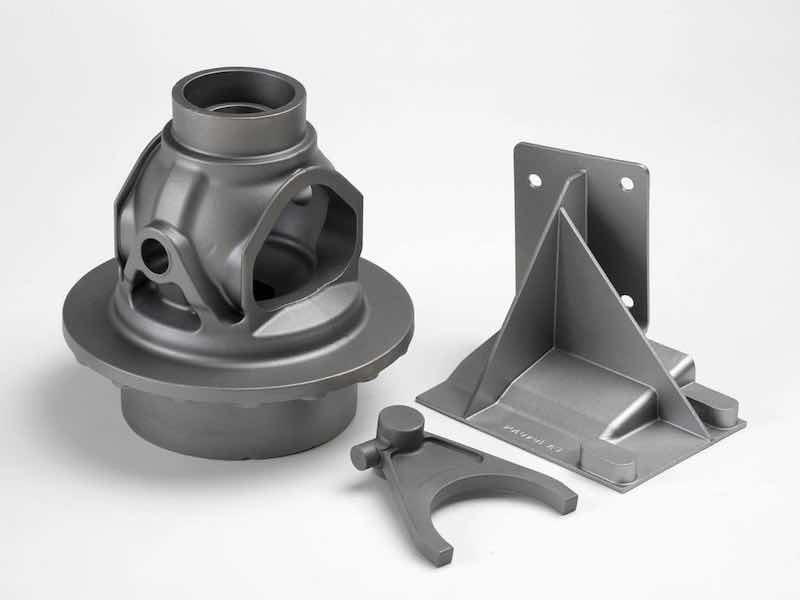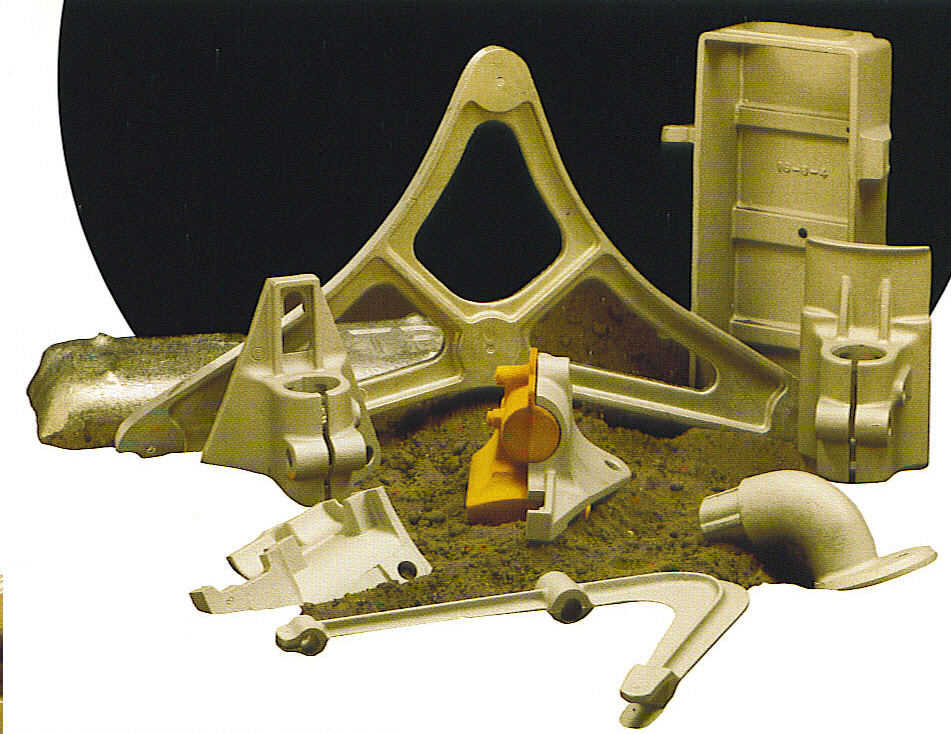Discover why Wisconsin Aluminum Foundry and Aluminum Castings are important in manufacturing
Finding the Essential Applications of Light Weight Aluminum Castings Across Different Markets
Light weight aluminum spreadings play a necessary role in several industries. Their light-weight and durable qualities add to innovations in vehicle and aerospace sectors. Additionally, they boost building honesty and consumer item layout. As sustainability ends up being a concern, the ecological advantages of light weight aluminum spreadings further highlight their value. Understanding the comprehensive applications of this material can expose insights right into modern production methods. What particular improvements are being made in these numerous industries?
Automotive Industry Innovations

In addition, aluminum castings play a vital duty in electrical lorries, where weight reduction is extremely important for battery performance. With the integration of aluminum in engine blocks, transmission housings, and structural components, car manufacturers can achieve superior durability while preserving peak performance. As the need for sustainable and efficient vehicles expands, the automotive field remains to accept light weight aluminum spreading advancements, placing itself at the forefront of technical developments and environmental duty.
Aerospace Advancements
While the aerospace sector continuously seeks means to enhance efficiency and performance, improvements in aluminum castings have actually become a crucial consider accomplishing these goals. The light-weight nature of light weight aluminum considerably adds to fuel efficiency, minimizing overall airplane weight without jeopardizing architectural stability. Technologies in casting methods, such as die casting and financial investment spreading, permit for detailed layouts that enhance the rules of aerodynamics and efficiency.
Innovations in metallurgy have boosted the strength and deterioration resistance of aluminum alloys, making them suitable for various aerospace applications, including engine parts and body structures. The capability to produce complex forms reduces the number of parts required, streamlining assembly procedures and reducing maintenance demands. As aerospace suppliers progressively turn to aluminum castings, they are finding that these improvements not just drive operational efficiency yet additionally support sustainability objectives with decreased power consumption during trip.
Building and construction Applications
Light weight aluminum castings play a pivotal role in the building and construction industry, offering a combination of stamina, sturdiness, and light-weight homes that enhance architectural stability. Aluminum Foundry. These castings are utilized in a range of applications, including window frames, door frameworks, and roof, where their resistance to deterioration and weathering is particularly useful. Moreover, aluminum castings add to energy performance, as their lightweight nature reduces the total lots on frameworks, promoting much easier transportation and setup
Furthermore, the versatility of light weight aluminum enables complex geometries and intricate styles, conference visual needs without compromising architectural performance. In seismic regions, aluminum castings can be utilized in vital architectural components, offering considerable benefits relating to adaptability and resilience. Generally, making use of light weight aluminum castings in construction not just improves the efficiency of structures however likewise sustains sustainable structure techniques by enabling making use of recyclable products in building projects.

Durable Goods Manufacturing
In consumer products making, aluminum spreadings play a vital function in lightweight item design, enabling easier handling and boosted performance. Their enhanced resilience features contribute to the long life and integrity of daily items. This mix of benefits makes aluminum a preferred material in the affordable durable goods market.
Lightweight Item Layout
As manufacturers progressively focus on effectiveness and sustainability, lightweight item style has become a crucial aspect of durable goods advancement. The integration of light weight aluminum castings enables designers to develop products that are not just lighter however likewise more energy-efficient. This decrease in weight adds to decrease transport expenses and enhanced user experience, as customers check my site increasingly look for easier-to-handle goods. In addition, light-weight designs facilitate ingenious appearances, enabling brands to differentiate themselves in a competitive market. The versatility of aluminum allows for elaborate forms and kinds, improving general style freedom. Light-weight item layout is coming to be necessary for firms intending to meet contemporary customer needs while adhering to ecological considerations. This trend is improving exactly how products are conceived and produced across various markets.
Improved Resilience Functions
While contemporary customers require products that are both light-weight and cosmetically pleasing, improved longevity features have ended up being equally important in durable goods producing. Light weight aluminum castings supply remarkable strength-to-weight ratios, permitting producers to develop items that withstand day-to-day deterioration. The integral corrosion resistance of aluminum assurances that products maintain their look and functionality gradually, reducing the demand for frequent substitutes. Additionally, casting methods make it possible for the production of smooth layouts that improve structural stability. Consequently, producers can supply consumer items that not only satisfy efficiency assumptions but additionally supply durability. This concentrate on longevity not just enhances consumer fulfillment yet additionally straightens with sustainability goals by minimizing waste and advertising accountable intake.
Electric and Electronics Market
The electrical and electronic devices field increasingly depends on light weight aluminum castings for their light-weight, durable, and highly conductive residential or commercial properties. These castings are integral in making numerous parts, including real estates, rooms, and heat sinks. Their reduced density enables for decreased overall weight in electronic gadgets, boosting transportability without compromising performance. In addition, aluminum's superb thermal conductivity is vital for dissipating heat produced by digital elements, making certain perfect operating and longevity.
Additionally, light weight aluminum spreadings give outstanding find this rust resistance, which is essential for preserving digital integrity in numerous environments. The ability to create complex forms and detailed layouts through spreading methods additionally sustains innovation in item growth, permitting producers to fulfill specific technological requirements. As the need for energy-efficient and high-performance electronic devices remains to expand, aluminum castings are positioned as an essential material, facilitating developments in modern technology across the sector. Their versatility and dependability make them essential in the modern-day electrical and electronic devices landscape.
Sustainability and Ecological Influence
Identifying the expanding worry for environmental sustainability, the light weight aluminum casting industry has made considerable strides in lowering its ecological footprint. The production of light weight aluminum castings now significantly makes use of recycled materials, lessening power usage and basic material removal. This change not only saves sources but also reduces greenhouse gas exhausts related to main aluminum manufacturing.
In addition, innovations in innovation have resulted in more reliable spreading processes, even more lowering waste and enhancing energy performance. Several manufacturers are taking on lasting practices such as closed-loop systems that recycle water and minimize commercial waste.
Aluminum's lightweight nature enhances gas efficiency in transport fields, contributing to lower discharges over the lifecycle of automobiles. As the market proceeds to innovate and focus on sustainability, aluminum spreadings are poised to play a vital function in promoting environmentally liable techniques throughout different industries, lining up with international efforts to fight climate modification and promote sustainable development.
Frequently Asked Inquiries
What Are the Conveniences of Aluminum Castings Over Various Other Products?
Light weight aluminum castings supply lightweight buildings, superb deterioration resistance, and great thermal conductivity. Additionally, they enable complex designs, reduce manufacturing expenses, and supply improved longevity, making them beneficial compared to traditional products like steel or iron.
Exactly How Are Aluminum Castings Produced?
Light weight aluminum spreadings are produced via procedures like sand spreading, die spreading, and investment spreading. Molten light weight aluminum is poured into mold and mildews, permitted to cool, and afterwards eliminated, resulting in resilient and precise elements for various applications.
What Is the Normal Lifespan of Light Weight Aluminum Castings?
The normal life-span of aluminum this content spreadings varies between 10 to 50 years, depending upon ecological elements, use conditions, and alloy structure. Correct maintenance and care can substantially expand their longevity and performance in different applications.
Can Light Weight Aluminum Castings Be Recycled?
Yes, light weight aluminum spreadings can be reused efficiently (Aluminum Castings). The reusing process maintains the steel's residential properties, making it a sustainable alternative for numerous applications, consequently adding to environmental preservation and resource administration within several sectors
What Industries Are Emerging for Light Weight Aluminum Casting Applications?
Arising industries for light weight aluminum spreading applications consist of electric vehicle manufacturing, sustainable power fields, aerospace developments, and clinical modern technology. These fields utilize light weight aluminum's lightweight, resilient buildings to introduce and boost performance in different products and systems.
While the aerospace market continuously looks for methods to improve performance and efficiency, improvements in light weight aluminum spreadings have emerged as a vital aspect in achieving these objectives. Aluminum castings play an essential duty in the building and construction market, using a combination of strength, sturdiness, and lightweight homes that improve structural stability. In consumer items making, aluminum castings play a critical duty in light-weight product layout, enabling for easier handling and improved performance. The electrical and electronics field increasingly depends on light weight aluminum castings for their lightweight, sturdy, and extremely conductive residential properties. Aluminum castings are generated through processes like sand spreading, pass away spreading, and financial investment casting.